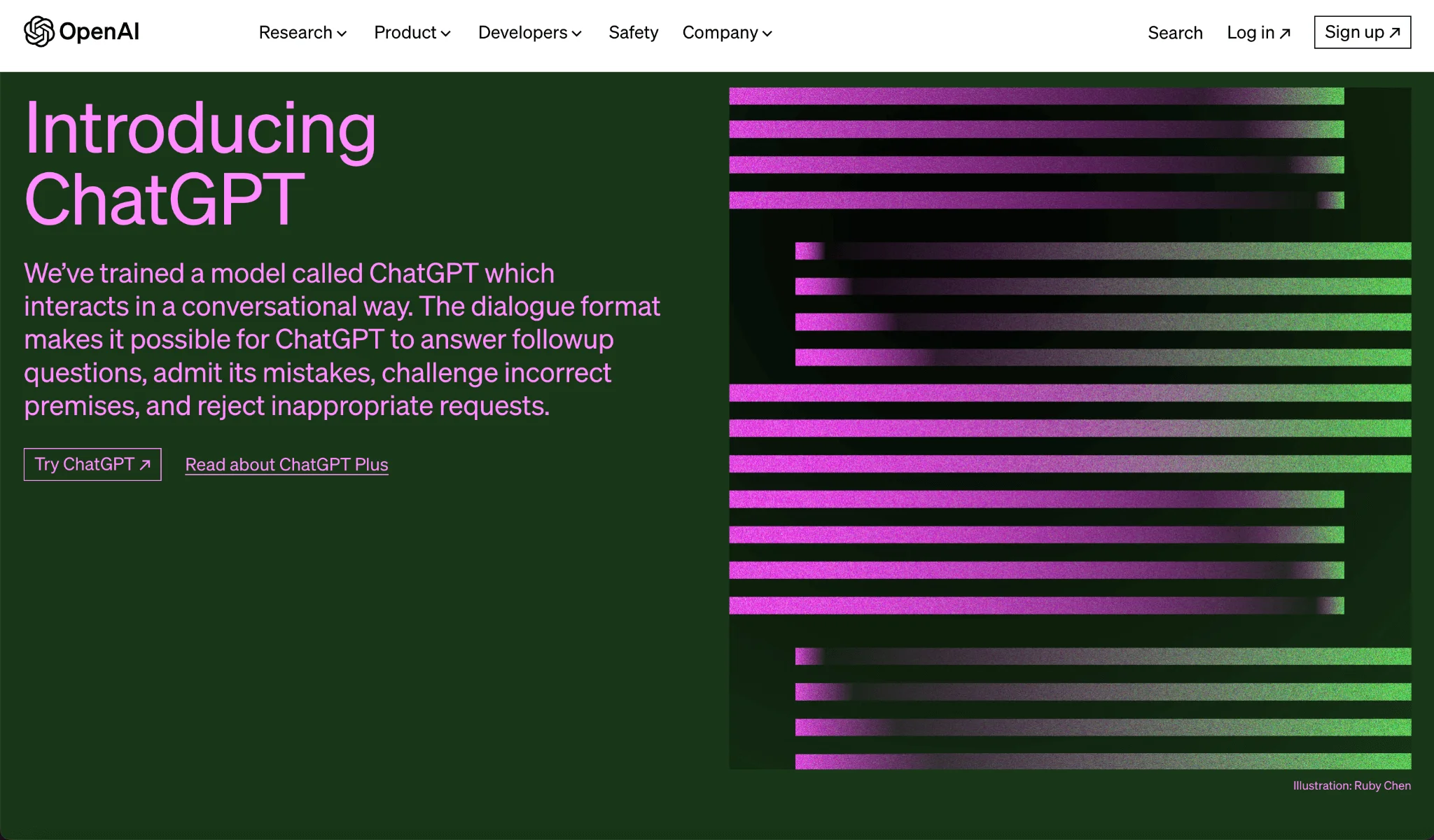Answered in 3-Minute: Is ChatGPT Safe to Use?
As the popularity of ChatGPT continues to skyrocket, questions of safety naturally arise. 'Is ChatGPT safe?' becomes a pivotal question. This concise guide explores this query, unraveling key facts and shedding light on potential risks. If you're eager to ensure secure usage of this leading-edge technology, you've found the perfect starting point. Stay with us and unravel the truth about ChatGPT's safety!

Overview of ChatGPT and How it Works
ChatGPT is a conversational AI bot from OpenAI. It utilizes advanced natural language processing for impressively human-like dialogues. This innovative technology is powered by deep learning and a machine learning structure called a transformer neural network.
This bot uses GPT-3.5, a transformer model with a staggering 175 billion parameters, an enhancement over previous language models. It gains its language expertise from various online texts, learning language patterns, grammar, and phrase connections.
While trained to continue thoughts coherently in a human-like manner, it has limitations in accuracy and reasoning, pointing to the vast scope for future AI development.
Key Privacy Concerns Around ChatGPT Data
Given ChatGPT's capabilities, what are the privacy implications of its data collection? This question forms a core part of evaluating the AI's safety.
Does ChatGPT Record and Store All Conversations?
Yes, ChatGPT logs your every word. This allows OpenAI to train its AI using real user interactions continuously.
Problematically, you cannot selectively or permanently delete specific prompts from your chat history. Anything you say to ChatGPT persists in its databases.
This becomes concerning when you share personally identifiable information without considering the privacy risks. Details like your name, location, employer, or confidential information are then permanently stored.
Could Your ChatGPT History Be Hacked or Leaked?
Theoretically, your stored chat logs could be accessed through a data breach. So far, OpenAI's security has been relatively robust.
But in March 2023, a bug did cause some users to see portions of others' chat history temporarily. In the same incident, payment information leaked from ChatGPT Plus subscribers.
While quickly fixed, this glitch highlights the constant threat of cyber attacks, unintentional leaks, and insider risks at any web service. Total data confidentiality can never be guaranteed.
What Exact User Data Does OpenAI Collect?
According to its privacy policy, OpenAI may collect an extensive range of user information:
Contact details like name, email address, and phone number
ChatGPT conversation history and other content
Usage data like frequency, sessions, and more
Device identifiers and network activity
Precise real-time location while using ChatGPT
Any optional data you directly provide
Payment and billing information
This data enables ChatGPT's functionality but also introduces vulnerabilities that malicious actors could exploit.
Can Users Control How Their Data Is Used?
OpenAI allows opting out of your data for training its AI systems. However, you cannot use ChatGPT without agreeing to basic data collection for functionality.
Overall, OpenAI could improve transparency around data usage. Users have minimal visibility into how their information trains ChatGPT's AI behind the scenes.
Job Loss from Increased Automation
Teachers, authors, and other professions could be impacted by capable AI. But current accuracy issues limit ChatGPT's ability to replace humans fully.
Security Risks and Misuse Potential
In addition to privacy concerns, ChatGPT poses some security and misuse risks inherent to its advanced AI capabilities.
Could ChatGPT Be Used for Hacking and Cyberattacks?
Unfortunately, yes. ChatGPT's conversational nature means it can teach hacking skills if asked directly. Its code generation abilities could also help automate and scale cyberattacks.
For example, ChatGPT could generate phishing emails, fake news websites, social media bots, and other content that maliciously deceives people. Its human-like writing skills make such scams more convincing.
Some users have even probed ChatGPT's willingness to provide dangerous hacking instructions, with mixed results, as OpenAI has safeguards in place. But its capabilities make monitoring for misuse an endless challenge.
Risk of Widespread Disinformation Campaigns
Beyond hacking, ChatGPT could automate the creation of disinformation and propaganda campaigns at a new scale.
Its ability to churn out authentic-sounding content around any topic without fact-checking makes this a real danger.
Anonymous actors could leverage ChatGPT to mislead the public about political candidates and health topics like COVID-19. The impacts could be far-reaching.
AI-Generated Media Content Risks
In addition, AI like ChatGPT can now generate fake images, videos, and audio clips with increasing realism.
Combined with its writing skills, it can create fictitious media stories promoting false narratives. Detecting such "deepfakes" is exceptionally challenging.
Job Loss and Economic Impacts
Many experts warn that advances in AI like ChatGPT will disrupt entire industries and professions. At the highest risk are jobs involving repetitive information tasks.
Roles like data entry, bookkeeping, paralegal work, and computer coding could be automated by capable AI. Significant job loss and economic impacts may follow.
However, the extent to which generative AI replaces human roles versus creating new opportunities remains debated. Maintaining human oversight of AI systems is crucial either way.
Best Practices to Safely Use ChatGPT
While risks exist, you can take sensible steps to interact with ChatGPT securely:
Never share personal, confidential, or sensitive information. This includes private conversations, passwords, addresses, IDs, and more.
Frequently review and understand OpenAI's privacy policy and terms of service. Check for any changes in how your data may be used.
Consider using an anonymous or secondary account when chatting with ChatGPT, keeping it disconnected from your real identity.
Monitor OpenAI's blog and announcements for security updates and changes to their data usage and retention policies.
Avoid third-party services offering paid access to "premium" ChatGPT capabilities. These could easily be scams trying to steal your money or data.
Fact-check any important content ChatGPT generates to guard against inaccuracies or biases. Use trusted sources to verify the information.
Provide neutral feedback when ChatGPT makes inappropriate suggestions so it improves safely. Don't encourage harmful or dangerous responses.
Staying vigilant is key - generative AI evolves rapidly. Following common sense security practices helps you benefit from ChatGPT while protecting your privacy and safety.
The Need for Responsible AI Governance
ChatGPT makes clear the urgent need to govern AI thoughtfully as its influence grows.
Legislators must develop frameworks for ethically handling AI capabilities like natural language generation. Core focuses should include privacy, security, and social impacts.
AI companies like OpenAI have a duty to self-regulate responsibly. This means maximizing transparency around data practices, monitoring for misuse, and considering social consequences when advancing capabilities.
Democratic oversight and public debate should guide AI development. As citizens, we must consider how technologies like ChatGPT should be shaped to benefit society.
"Slow AI" approaches may be prudent to gradually integrate generative models into our lives. Moving too fast risks consequences, we cannot foresee or manage.
Developing advanced AI safely demands diverse perspectives. Representation from marginalized groups helps identify blind spots.
We must invest in understanding risks, fostering AI literacy, and making ethical engineering choices. Carelessness could lead to catastrophic mistakes.
Progress in AI will march onward. But wisdom and caution must run in parallel to developments like ChatGPT. With collective responsibility, we can steer innovations to uplift humanity.
Conclusion
We hope this guide has clarified your concern about whether ChatGPT is safe to use. ChatGPT offers astonishing AI capabilities, but as users, we must enter this new frontier with eyes open to the risks. We can guide this technology responsibly by staying vigilant around privacy, security, and social impacts. Together, through care and wisdom, we can unlock ChatGPT's potential to improve our world. Safe chat!
